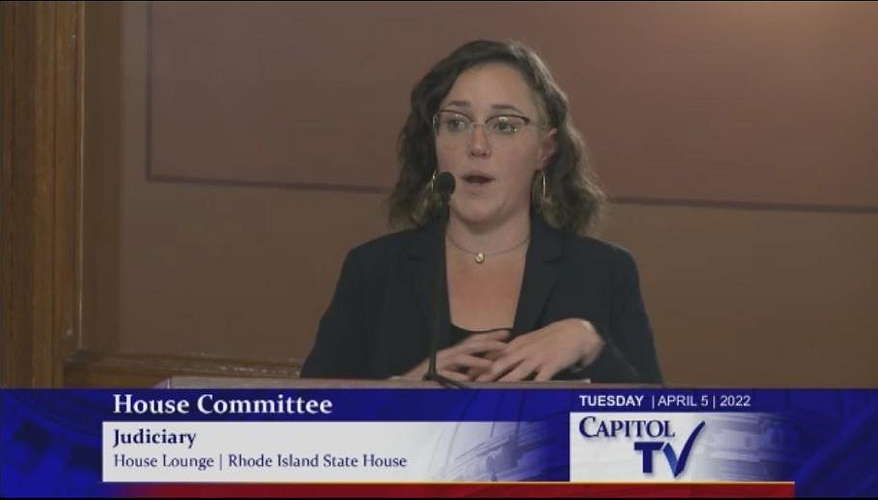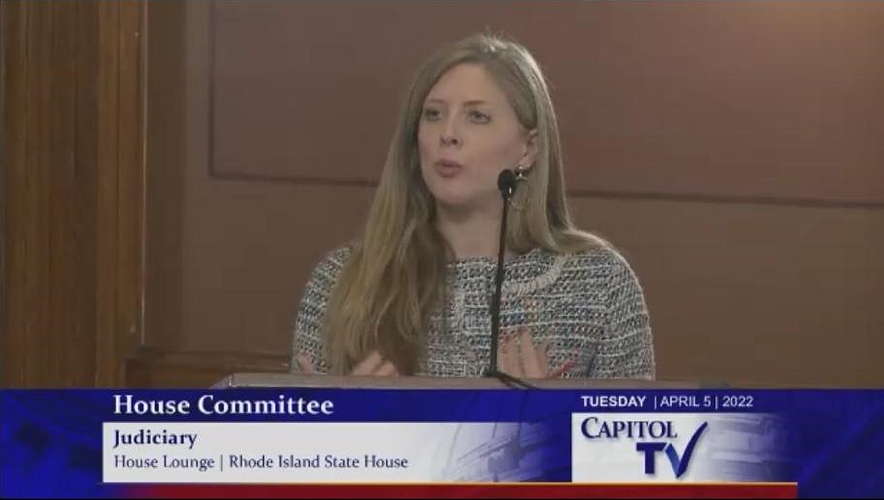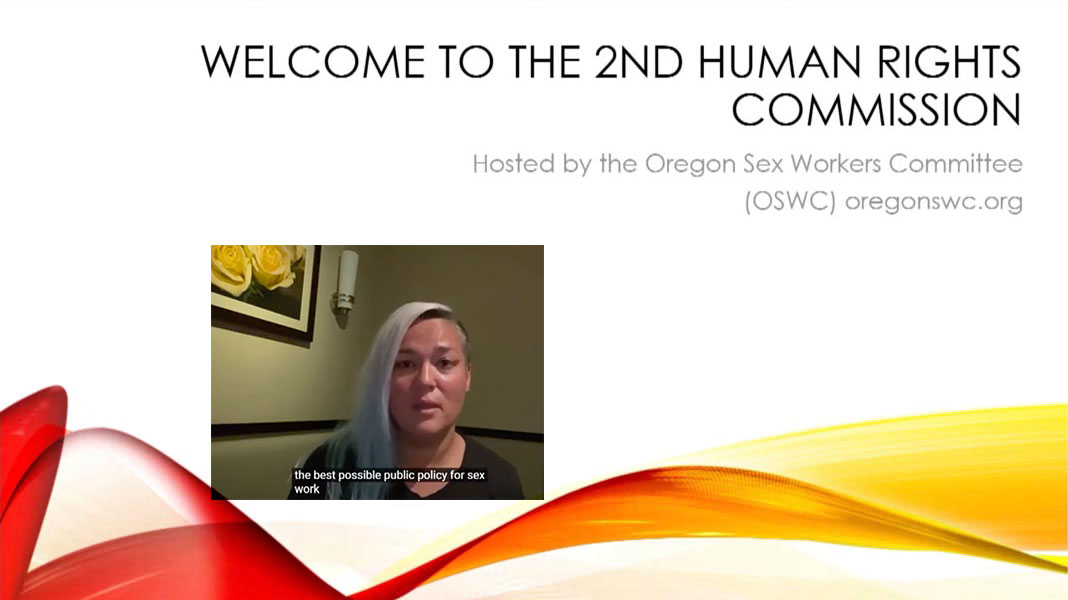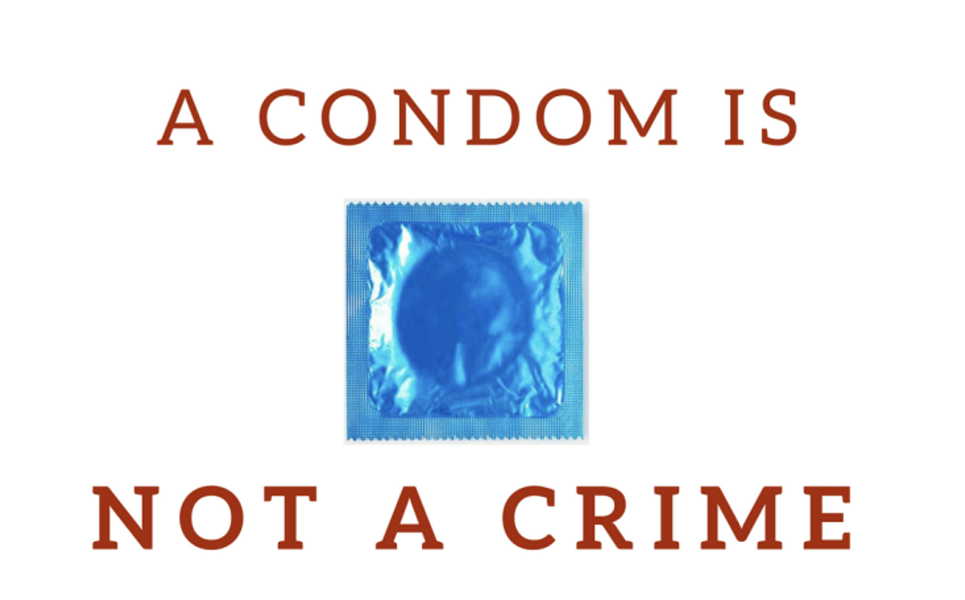April 5, 2022
DSW’s legal director, Melissa Broudo, and staff attorney, Rebecca Cleary, traveled to Rhode Island to testify in support of three important bills making their way through the Rhode Island legislature. As DSW works towards our ultimate goal of the decriminalization of consensual adult sex work, we are advocating for incremental measures that will reduce exploitation and violence perpetrated against sex workers and survivors of trafficking. If passed, the three bills introduced in RI, which Broudo and Cleary testified in support of, would bring immediate health and safety benefits to individuals engaged in sex work.
H7704, currently being reviewed by the House Judiciary Committee, grants immunity from prosecution for commercial sexual activity to any victim or witness of a crime if they report the offense to law enforcement, seek or receive health care services as a result of their involvement or witnessing the offense, or assist or attempt to assist in the investigation and prosecution of the offense. Importantly, this protection is honored even if they later withdraw their cooperation.
People involved in the sex trade (whether by choice or by force, fraud, or coercion) are often victims of violent crime and exploitation, but they frequently don’t report crimes perpetrated against them due to fear of arrest. When abusers are not reported to law enforcement, they are able to continue acts of violence and exploitation with impunity. Immunity laws allow sex workers and trafficked people to safely report crimes and seek medical care without the fear that they themselves will be criminalized. They equip law enforcement entities with an increased ability to identify, investigate, and convict perpetrators of violence and trafficking. Immunity laws directly protect victims and witnesses of violence and they ultimately benefit all communities by allowing law enforcement to better detect criminal activity.
H6637 / S2233, in committee, establishes criteria for the criminal offense of sexual assault when the victim is in the custody of a peace officer. It provides that a person convicted of custodial sexual assault would face imprisonment for not more than three years. Forty states have laws making sexual interaction between a law-enforcement agent and a person in their custody illegal.
As Broudo wrote, “Most people cannot believe police are permitted to do this. The reality is that they should not, but that they do, on quite a regular basis. Sex workers and those profiled as sex workers — especially transgender women of color — are subject to routine sexual assault by police offering ‘deals’ (‘if you do this, I will not arrest you now’). This is not consent — in fact, it is the very definition of coercion. Other states, including Nevada and Pennsylvania, are currently considering similar laws to punish custodial sexual assault. To say there is a power imbalance between law enforcement and those in their custody would be a severe understatement — people who are in custody have no agency, have fear about what is to come, and are at the complete and total mercy of those who have taken them into custody. There cannot possibly be a consensual sexual encounter between someone in custody and the person in charge of their freedom. When you think of who may be in custody, there is a disproportionate chance that person will be part of a marginalized or more vulnerable group [people of color, specifically Black and Brown people, are significantly more likely to be arrested]. When it comes to sex work, Black and Brown women, especially transgender women, are the most likely to be arrested — and also the most vulnerable to exploitation, abuse, and stigma. These factors are easily exploited by law enforcement.”
H7672, currently in committee, mandates a patient shall “be afforded respectful, considerate care” not be discriminated against on any basis including age, sex, gender identity, sexual orientation, or income source or profession.
Health care access is critical for the rights and safety of all. This is especially true when it comes to sex workers who face increased risk of sexually transmitted infections (STIs), sexual assault, and physical assault as a result of the criminalization of their work. Many sex workers do not seek critical healthcare because they have faced discrimination, or reporting to law enforcement by medical professionals. Protection against discrimination in seeking care is not only life-saving; it’s an important step in protecting against the spread of STIs and increasing resource access for some of our most underserved community members.
Further, healthcare providers serve a critical role in identifying and helping to report (with the patient’s permission) instances of human trafficking. Unfortunately, because of the criminalization of commercial sex, individuals trafficked for the purpose of selling sex are afraid to seek services. This is not only a violation of human rights, it is a public health and safety concern. We must make safe, confidential, and appropriate healthcare resources available to all individuals.

Rebecca Cleary testifies in front of the RI House Judiciary Committee.

Melissa Broudo testifies in front of the RI House Judiciary Committee.
DSW Newsletter #35 (April 2022)
DSW Testified on Important Sex Work Bills in RI

CO Quickly Advances the Safe Reporting Assaults Suffered by Sex Workers Act

DSW Report Finds Strong Racial and Gender Biases in Prostitution and Trafficking Enforcement

Oregon Sex Workers Committee’s Human Rights Commission

STI Awareness Month

Save the Dates

